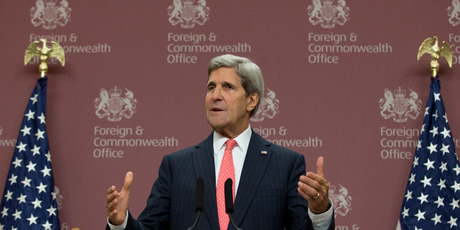Is Everyone Happy? Smile!
"I've worked in this field for a long time, and I've studied the history. I know of no analogous period. I've never seen so many disagreements on so many key fronts all at once. And I've never seen such a willingness on the part of the Saudis to publicly express their frustration.
"Iran is the No. 1 issue -- the only issue for Saudi policy makers. When you add up the whole Middle Eastern map -- Syria, Iraq, Iran -- it looks to the Saudis as if the U.S. is throwing Sunni allies under the bus by trying to cut a deal with Iran and its allies."
Michael Doran, Middle East expert, Brookings Institution
"I explained exactly where the U.S. is coming from and will continue to consult with our Saudi friends as we always have in the past.The head of Saudi intelligence on the blatantly clear evidence at hand has declared it time to be "scaling back" co-operation with the U.S. Central Intelligence Agency. It has become abundantly clear that the cooperative trust that the Saudis placed over their 80-year relationship with the United States appears to be played itself out. The Obama administration's hands-off attitude to arming the Syrian rebels at an early stage in the rebellion that has turned into a no-holds-barred civil war enraged Saudi Arabia.
"The Saudis were obviously disappointed the strikes didn't take place, and have questions about some other things that may be happening in the region.
"The United States and Saudi Arabia will continue to be the close and important friends and allies that we have been."
U.S. Secretary of State John Kerry
Seeking to punish the United States, it has indicated it will begin a search for alternate weapons suppliers. Since the United States is the world's number one national supplier of arms to international designations and is committed to continue in that role, the prospect of the large and profitable Middle East market so suddenly shrinking cannot be a comfortable one for the administration. But of course, the administration hoists its trousers and speaks of standing on principles.
It was, evidently, principles also that came into play when Saudi Arabia announced its stunning decision to bypass a seat on the UN Security Council. That decision had one paramount purpose; to deliver "a message for the U.S.", describing the incandescent anger simmering within the Saudi government. Prince Bandar Bin Sultan Al-Saud's declaration to scale back cooperation between the countries cemented the cast of the die.
As angry as the Saudis are over the Syrian situation with the ongoing presence of President Bashar Al-Assad, a Shia Alawite dictator who has been busy using a veritable compendium of means by which to slaughter Sunni Syrian civilians in punishment for their arrogance in believing they could conduct a rebellion with the purpose of removing them from power, they are yet more furious over the perceived American rapprochement with the Islamic Republic of Iran.
Iran has replaced Israel in the Saudi perception of an unsettling military threat within the Middle East. And whereas Israel never had any intention of replacing Saudi Arabia as the most authoritative, dominant presence in the Middle East, the Republic of Iran most certainly is vying for that recognition. And seeks to obtain it through the power and respect it expects to gain when it can threaten its neighbours with nuclear warheads.
And suddenly Saudi Arabia -- while shedding trust and good faith in and with the United States over its failure to assert its authority within the United Nations in the matter of the Syrian slaughter and the bold about-face by Iran presenting itself as a willing partner after all to nuclear and uranium enrichment negotiations -- finds itself struggling with the realization that it suddenly has more in common with Israel than it might ever have imagined.
Prime Minister Benjamin Netanyahu has made no secret about how his country and his administration feels respecting the attainment of nuclear warheads by Iran, American statements that it would never permit Iran to reach that point notwithstanding. It no longer has the trust it once had on America's "red lines", since they're too readily disposable. The world, he emphasized in a meeting with John Kerry should never accept a "partial deal" with Iran.
Any agreement that does not strictly require Iran to cease all of its uranium enrichment, force it to rid itself of all fissionable material, to close water plants and underground bunkers whose only use is for the building of a nuclear bomb, would be utterly useless. The negotiations between Iran and world powers have resulted in nothing other than continued insistence from Iran that it is entitled and has the right to continue its nuclear aspirations.
And that nothing will stop it from processing uranium, although it did concede that it might be convinced to shut down a few of those thousands of frantically spinning centrifuges. It is infuriating that G5+1 negotiators keep spinning a message of encouraging signs emanating from Iranian negotiators when what they continue to spin is the same old line of entitlements and determination. The tough restrictions that sanctions backed are nowhere in sight.
Labels: Iran, Israel, Nuclear Technology, Saudi Arabia, Syria, United States


<< Home